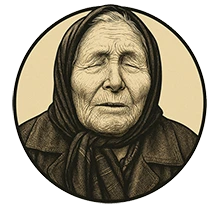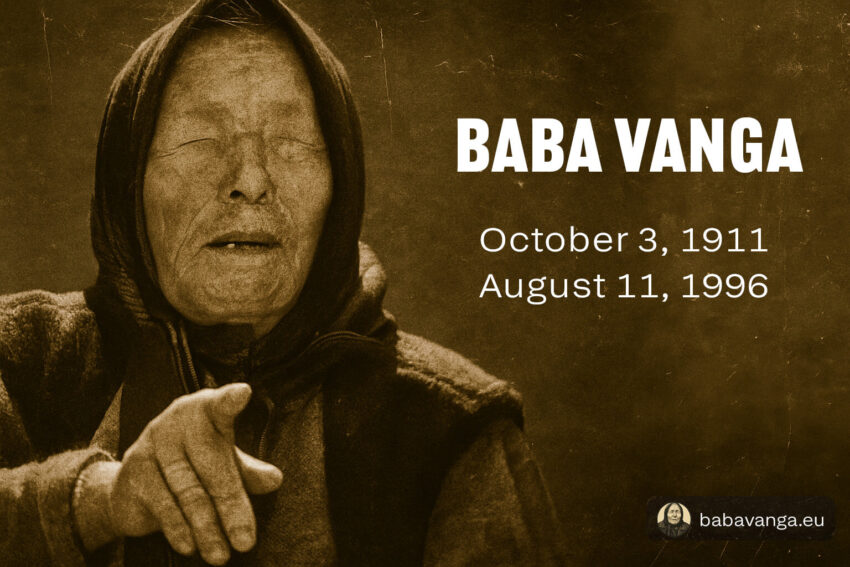| Born | October 3, 1911 — Strumica (then Ottoman Empire; now North Macedonia) |
|---|---|
| Died | August 11, 1996 — Petrich, Bulgaria |
| Zodiac Sign | Libra ♎ |
| Life Path Number | 7 |
Baba Vanga was a Bulgarian healer, mystic, and prophetess. She was born as Vangelia Pandeva Dimitrova in Strumica, then a part of the Ottoman Empire, later belonging to Yugoslavia, and today lying within North Macedonia. Even the date of her birth has remained uncertain. Some records claim January 31, 1911, while others point to October 3 of the same year. Since the latter date is repeated most often, it is usually accepted as the most likely.
Her beginning in life was difficult. She was born two months prematurely, without the help of a midwife or doctor. This fragile entry into the world may have played a role in her weak eyesight, which worsened as she grew older.
Her parents named her Vangelia, meaning “the bringer of good news.” In time, however, her name would come to symbolize something different: one chosen to see what others could not. The people eventually called her “Baba Vanga, the clairvoyant selected by God.”
Her father, Pande Surchev, was a policeman born in Novo Selo. He had once been imprisoned by the Turks in Yedi Kule. Released in 1908, he moved to Strumica and married Paraskeva, who bore him children but died soon after the second birth. Vanga was only two years old when she lost her mother.
In 1915, during the First World War, Pande was called to the front. Relatives cared for the little girl until he returned and remarried. His new wife, Tanka Georgieva, was regarded as one of the most beautiful women in Strumica, but she never formed a bond of maternal love with her stepdaughter. Vanga spent much of her time with her grandmother instead, especially when her father was once again imprisoned and his property confiscated because of his past. The details remain unclear, but the family slipped into poverty.
The storm and blindness
When Vanga was twelve, her life changed forever. Each day she was sent out of the village with a donkey to fetch milk. One summer day she went with her cousins and on the way stopped at a place called Anskata Česma. Suddenly, a violent storm broke out. The sky darkened, the wind uprooted trees, and Vanga herself was lifted and hurled far into the fields.
Later attempts to verify this incident found no supporting evidence in contemporary weather records or the local press. A storm strong enough to carry away a child, with winds around 180 km/h, would likely have left clearer traces.
There exists, however, another disturbing note. Police records from 1923 mention an unnamed girl near Novo, about twelve years old, who had been raped and then blinded. Whether this refers to Vanga is a matter of speculation—and one most historians consider improper to pursue.
What is certain is that she was found two days after the storm, buried beneath branches, earth, and stones. She was terrified, her eyes full of dust and blood, blinded by unbearable pain. Her irises later turned white. Multiple operations in Skopje and Belgrade failed to restore her sight. Church records from Novo Selo reveal that neighbors collected money for her treatment, though the funds covered only temporary therapy, which fueled further speculation.
She wept and prayed, longing to see again. But the miracle never came.
Schooling and first love
Unwilling to remain a burden, she was sent to a school for the blind in Zemun, today part of Belgrade. There she learned Braille, weaving, sewing, and how to care for herself.
As she grew into a beautiful young woman, she fell in love with a boy from the village of Gevgelija, Dimiter. According to some, her beauty was often the subject of gossip and speculation. Dimiter confessed his love and proposed marriage. His wealthy parents did not object. Yet destiny intervened once again: her father, newly widowed for a second time, came to take her home. He needed someone to care for his other children—Vasil, Tomo, and Ljuba. Vanga’s days became filled with work, house duties, and responsibility.
In 1939, she became seriously ill with pleurisy and hovered between life and death for eight months. Just when everyone had lost hope, she suddenly rose from her bed one day and began cleaning the house. The burden of her life, however, continued.
The prophetic vision
On April 6, 1941, she experienced a vision that would change her forever. She described it as the appearance of a horseman bathed in light—some accounts identify him as Saint John Chrysostom, others as a radiant officer, tall and handsome. He stood before her and said:
“The world will soon change. Many people will vanish. There will be war. You will foretell the fate of the living and the dead. Do not be afraid—I will stand beside you and tell you what to say.”
From this moment, the thirty-year-old Vanga began to prophesy.
At first she saw battles, names, and events in her dreams, then later in waking visions. To the people of Strumica, she revealed which soldiers would return from the front and which would not. Soon, she also began advising people on their everyday problems. Her fame grew.
She became known not only as a seer but also as a healer. With the herbs and remedies she recommended, many patients found relief from illnesses thought incurable at the time. People came to her not just for predictions but to weep out their pain and suffering. She located lost animals and missing possessions with uncanny accuracy. She refused no one.
Meeting her husband
In 1941 she met Dimitar Gushterov from Krnzhilitsa. He came to ask about his brother, who had died under unclear circumstances. Vanga told him she knew who was responsible but refused to say, so he would not seek revenge. She also told him he was destined to marry her.
Later she recalled: “A young man entered the room, and the icon said: ‘Your husband is coming.’ And indeed, he became my husband, as fate had decreed.”
Other sources describe the story differently: a group of Bulgarian soldiers came to test her powers, and among them was Dimitar, hesitant to enter. Vanga came out herself, called him by name, and revealed she knew about his brother’s death. Shaken, he left, but eventually returned, and the bond between them grew until they married.
They moved to Petrich, to Oplčenska Street No. 10, where they lived in a single room until Dimitar built a larger home. For decades this house became the place where visitors came to see the prophetess, until she later began receiving people in her summer home in Rupite, fourteen kilometers away.
The stream of visitors
From 1942 until 1996, hundreds of thousands passed through her doors—people burdened by illness, grief, or despair, seeking hope.
In just one year, 1975, she received about five thousand letters, telegrams, and requests from across Bulgaria. Over the decades, hundreds of thousands more arrived, not only from within the country but from Yugoslavia, Turkey, the Soviet Union, Austria, Germany, France, Canada, and beyond. Many letters were thank-yous from those who felt healed or helped.
Appointments had to be booked up to two years in advance. Twenty people a day were scheduled, though she often received twice as many. Over the course of half a century, nearly a million people are believed to have visited her.
She spoke of historical events, predicted the fate of individuals, and passed on messages from the dead to the living—revelations that shook even the greatest skeptics. Visitors described the feeling of standing before her as overwhelming, as if stripped bare before a higher force.
Legacy
For more than half her life, Vanga, blind in this world but open to the spiritual one, dedicated herself to helping others see more clearly. People came to her home as though to a temple, entering quietly and humbly.
In her final years, she repeated one lesson again and again: that people should not quarrel, should not envy one another, but should love, forgive, and help each other.
On August 3, 1996, her health deteriorated sharply. She was admitted to Lozenets Hospital in Sofia, where doctors struggled in vain to save her. On Sunday, August 11, at exactly 10:10 in the morning, Baba Vanga died. Tradition claims that at that very moment, the entire hospital lost power—even its backup generators.
It was also said she had foretold this: when a doctor once asked for permission to study her brain after death, she replied, “That will not happen. You will die before me.”
Her church in Rupite remains a place of pilgrimage, a reminder that in Bulgaria once lived a remarkable woman—Aunt Vanga—devoted, compassionate, and extraordinary.
As the Bulgarian writer Zheni Kostadinova concluded in her book Vanga the Prophet:
“We bow before her blessed memory.”

